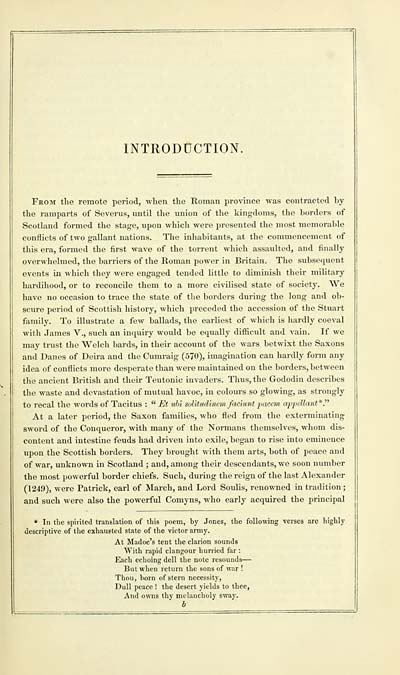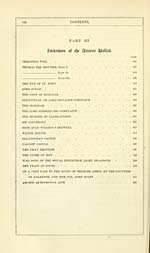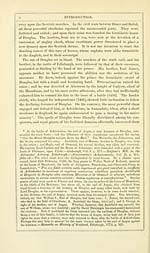Download files
Complete book:
Individual page:
Thumbnail gallery: Grid view | List view

INTRODUCTION.
Fro 31 the remote period, when the Roman province was contracted by
the ramparts of Severus, until the union of the kingdoms, the borders of
ScotUmd formed the stage, upon which were presented the most memorable
conflicts of two gallant nations. The inhabitants, at the commencement of
this era, formed the first wave of the torrent which assaulted, and finally
overwhelmed, the barriers of the Roman power in Britain. The subsequent
events in which they were engaged tended little to diminish their military
hardihood, or to reconcile them to a more civilised state of society. We
have no occasion to trace the state of the borders during the long and ob-
scure period of Scottish history, which preceded the accession of the Stuart
family. To illustrate a few ballads, the earliest of which is hardly coeval
with James V., such an inquiry would be equally difficult and vain. If we
may trust the Welch bards, in their account of the wars betwixt the Saxons
and Danes of Deira and the Cumraig (570), imagination can hardly form any
idea of conflicts more desperate than were maintained on the borders, between
the ancient British and their Teutonic invaders. Thus, the Gododin describes
the waste and devastation of mutual havoc, in colours so glowing, as strongly
to recal the words of Tacitus : " Et uhl solitudinem facimit pacein a2ypeHant*"
At a later period, the Saxon families, who fled from the exterminating
sword of the Conqueror, with many of the Normans themselves, whom dis-
content and intestine feuds had driven into exile, began to rise into eminence
upon the Scottish borders. They brought with them arts, both of peace and
of war, unknown in Scotland ; and, among their descendants, we soon number
the most powerful border chiefs. Such, during the reign of the last Alexander
(1249), were Patrick, earl of March, and Lord Soulis, renowned in tradition ;
and such were also the powerful Comyns, who early acquired the principal
* In the spirited translation of this poem, by Jones, the following verses are highly
descriptive of the exhausted state of the victor army.
At Madoc's tent the clarion sounds
With rapid clangour hurried far :
Each echoing dell the note resounds —
But wlicn return the sons of war !
Thou, horn of stern necessity,
Dull peace ! the desert yields to thee,
And owns thy melancholy sway.
b
Fro 31 the remote period, when the Roman province was contracted by
the ramparts of Severus, until the union of the kingdoms, the borders of
ScotUmd formed the stage, upon which were presented the most memorable
conflicts of two gallant nations. The inhabitants, at the commencement of
this era, formed the first wave of the torrent which assaulted, and finally
overwhelmed, the barriers of the Roman power in Britain. The subsequent
events in which they were engaged tended little to diminish their military
hardihood, or to reconcile them to a more civilised state of society. We
have no occasion to trace the state of the borders during the long and ob-
scure period of Scottish history, which preceded the accession of the Stuart
family. To illustrate a few ballads, the earliest of which is hardly coeval
with James V., such an inquiry would be equally difficult and vain. If we
may trust the Welch bards, in their account of the wars betwixt the Saxons
and Danes of Deira and the Cumraig (570), imagination can hardly form any
idea of conflicts more desperate than were maintained on the borders, between
the ancient British and their Teutonic invaders. Thus, the Gododin describes
the waste and devastation of mutual havoc, in colours so glowing, as strongly
to recal the words of Tacitus : " Et uhl solitudinem facimit pacein a2ypeHant*"
At a later period, the Saxon families, who fled from the exterminating
sword of the Conqueror, with many of the Normans themselves, whom dis-
content and intestine feuds had driven into exile, began to rise into eminence
upon the Scottish borders. They brought with them arts, both of peace and
of war, unknown in Scotland ; and, among their descendants, we soon number
the most powerful border chiefs. Such, during the reign of the last Alexander
(1249), were Patrick, earl of March, and Lord Soulis, renowned in tradition ;
and such were also the powerful Comyns, who early acquired the principal
* In the spirited translation of this poem, by Jones, the following verses are highly
descriptive of the exhausted state of the victor army.
At Madoc's tent the clarion sounds
With rapid clangour hurried far :
Each echoing dell the note resounds —
But wlicn return the sons of war !
Thou, horn of stern necessity,
Dull peace ! the desert yields to thee,
And owns thy melancholy sway.
b
Set display mode to: Large image | Transcription
Images and transcriptions on this page, including medium image downloads, may be used under the Creative Commons Attribution 4.0 International Licence unless otherwise stated. ![]()
| Early Gaelic Book Collections > J. F. Campbell Collection > Minstrelsy of the Scottish border > (17) |
|---|
| Permanent URL | https://digital.nls.uk/80600629 |
|---|
| Description | Volumes from a collection of 610 books rich in Highland folklore, Ossianic literature and other Celtic subjects. Many of the books annotated by John Francis Campbell of Islay, who assembled the collection. |
|---|
| Description | Selected items from five 'Special and Named Printed Collections'. Includes books in Gaelic and other Celtic languages, works about the Gaels, their languages, literature, culture and history. |
|---|

